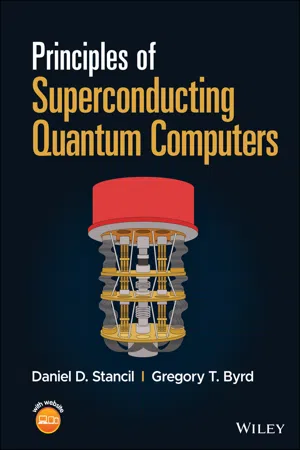
- English
- PDF
- Available on iOS & Android
Principles of Superconducting Quantum Computers
About this book
Explore the intersection of computer science, physics, and electrical and computer engineering with this discussion of the engineering of quantum computers
In Principles of Superconducting Quantum Computers, a pair of distinguished researchers delivers a comprehensive and insightful discussion of the building of quantum computing hardware and systems. Bridging the gaps between computer science, physics, and electrical and computer engineering, the book focuses on the engineering topics of devices, circuits, control, and error correction.
Using data from actual quantum computers, the authors illustrate critical concepts from quantum computing. Questions and problems at the end of each chapter assist students with learning and retention, while the text offers descriptions of fundamentals concepts ranging from the physics of gates to quantum error correction techniques.
The authors provide efficient implementations of classical computations, and the book comes complete with a solutions manual and demonstrations of many of the concepts discussed within. It also includes:
- A thorough introduction to qubits, gates, and circuits, including unitary transformations, single qubit gates, and controlled (two qubit) gates
- Comprehensive explorations of the physics of single qubit gates, including the requirements for a quantum computer, rotations, two-state systems, and Rabi oscillations
- Practical discussions of the physics of two qubit gates, including tunable qubits, SWAP gates, controlled-NOT gates, and fixed frequency qubits
- In-depth examinations of superconducting quantum computer systems, including the need for cryogenic temperatures, transmission lines, S parameters, and more
Ideal for senior-level undergraduate and graduate students in electrical and computer engineering programs, Principles of Superconducting Quantum Computers also deserves a place in the libraries of practicing engineers seeking a better understanding of quantum computer systems.
Tools to learn more effectively

Saving Books

Keyword Search

Annotating Text

Listen to it instead
Information
Table of contents
- Principles of Superconducting Quantum Computers
- Contents
- List of Figures
- List of Tables
- Preface
- Acknowledgments
- About the Companion Website
- 1 Qubits, Gates, and Circuits
- 2 Physics of Single Qubit Gates
- 3 Physics of Two Qubit Gates
- 4 Superconducting Quantum Computer Systems
- 5 Resonators: Classical Treatment
- 6 Resonators: Quantum Treatment
- 7 Theory of Superconductivity
- 8 Josephson Junctions
- 9 Errors and Error Mitigation
- 10 Quantum Error Correction
- 11 Quantum Logic: Efficient Implementation of Classical Computations
- 12 Some Quantum Algorithms
- Bibliography
- Index
Frequently asked questions
- Essential is ideal for learners and professionals who enjoy exploring a wide range of subjects. Access the Essential Library with 800,000+ trusted titles and best-sellers across business, personal growth, and the humanities. Includes unlimited reading time and Standard Read Aloud voice.
- Complete: Perfect for advanced learners and researchers needing full, unrestricted access. Unlock 1.4M+ books across hundreds of subjects, including academic and specialized titles. The Complete Plan also includes advanced features like Premium Read Aloud and Research Assistant.
Please note we cannot support devices running on iOS 13 and Android 7 or earlier. Learn more about using the app